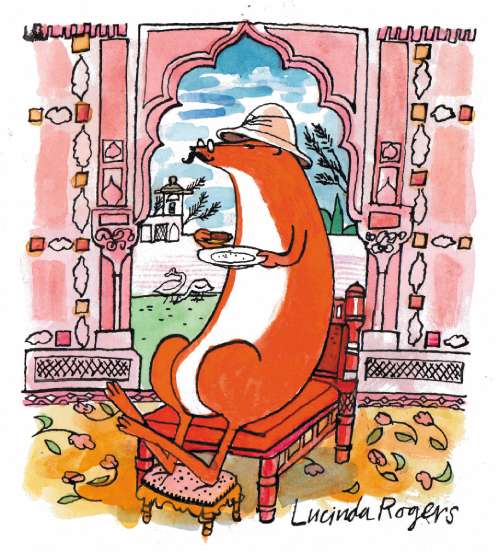The Weasel: A passage from India

Let's apply the chilling exam phrase "compare and contrast" to two recently re-issued cookbooks, which I shall temporarily cloak in anonymity. Book A recommends that "the store cupboard can be stocked with treasures", such as Heinz Tomato Frito and English Provender Very Lazy Caramelised Onions. Book B takes a similar tack, though with some reluctance: "There will be times and places when and where you will be obliged to fall back upon Messrs. Crosse and Blackwell and be thankful. Until those evil days come upon you, however, do not anticipate your penance." Book A briskly tells us to "cook the linguine in 2.25 litres boiling salted water for 8-10 minutes". Book B tackles the same process with metaphor and imagination: "An occasional bubble is what you want, with gentle motion, the water muttering to you, not jabbering and fussing, as it does when boiling." Book A is currently No.1 in the Amazon UK sales ranking, while Book B is No. 582,453.
Book A is, of course, Delia's How to Cheat at Cooking (Ebury, £20), first published in 1971 but completely re-written. Book B is Culinary Jottings for Madras by "Wyvern" (Prospect, £15), first published in 1878 but "very carefully" revised in 1885. Both authorial names are somewhat unusual. Such is Delia's eminence that her surname only appears on the book's copyright line. "Wyvern" is the nom-de-plume of Colonel Arthur Robert Kenney-Herbert of the Madras Cavalry. Ms Smith summarises her intention: "Without specific skills or precious time you can... produce spontaneous good food that's fun to prepare and free from anxiety." Putting spontaneity to one side, this is not too far from Col. Kenney-Herbert's introductory announcement: "I address my jottings to the many who yearn to follow reform, who 'like nice things better than nasty things', yet have hitherto failed to penetrate the secret of success."
Though aimed at the memsahibs of the Raj, Kenney-Herbert's "nice things" are remarkably modern in taste. For salad dressings, he rightly insists on "a libation of the finest oil you can buy" and to "abstain from the vinegar bottle as much as possible". Far from boiling cabbages for up to 45 minutes as specified by Mrs Beeton, he says: "Cabbages are better done in the steamer... The flavour of all green vegetables is more successfully developed by this system of cookery." He insists that chops should "bear the mark of the grid iron".
I wholeheartedly concur with the Colonel's view that "ham and mustard sandwiches should make your nose tingle with mustard", though his suggestion that when making a chicory salad "it is essential that the bowl be rubbed with garlic" brings to mind Elizabeth David's view in her book Summer Cooking that the effectiveness of this procedure "rather depends on whether you are going to eat the bowl or the salad". In fact, this culinary heroine very much approved of "Wyvern": "His recipes are so meticulous and clear that the absolute beginner could follow them."
Curiously, however, Jottings for Madras is not very useful for curry addicts. After rubbishing the curries encountered en route to the subcontinent – "The nautical curry is not, as a rule, a triumph to look back upon pleasurably with the half-closed eye of the connoisseur" – he takes a Delia line on the topic: "I strongly advocate the use of Barrie's Madras curry powder and paste." Sadly, my efforts to track down these condiments, both at the "Oriental Depot on the southern side of Leicester Square" and on the internet, did not bear fruit. For reasons associated with both quantity and survival, I did not attempt the Colonel's recipe for curry powder: 8lbs coriander seed; 4lbs turmeric; 2lbs cumin seed; 1lb black pepper; 1lb dried chillies...
The author's grasp of cavalry tactics is displayed when he tackles the ticklish problem of how to serve oysters and the requisite accompaniments simultaneously. "You sometimes see a hungry man polish off his bivalves before the lime, pepper and bread and butter have reached him. You can combat this contingency by breaking up the dishes containing these adjuncts into detachments, and serving them in two or three directions at once." On retirement to England, this literally peppery colonel ("I strongly advise my readers not to forget to ask for a little bottle of American 'Tabasco', priced half a crown") formed the Commonsense Cookery Association and became managing director of its school in 1894.
Surprisingly for a robust military man, "Wyvern" is particularly keen on hors d'oeuvres. If an officer in the Madras Cavalry sees nothing unmanly in assembling these "little dainties or kickshaws, carefully prepared and tastefully served to whet the appetite", then the same goes for the Weasel. I carefully prepared the Colonel's recipe for anchovy toast. Drain a tin of anchovy fillets and finely chop. Put the pulp in a bowl and stir in two raw egg yolks. Melt a tablespoon of butter in a double-boiler or bain-marie. Stir the anchovy and egg mixture into the melted butter, let it thicken and when quite hot pour over four slices of buttered toast. A subtle, delicious savoury, the snack magically whizzes you back to high tea at the height of the Raj. "Quite a revelation, not at all as salty as I was expecting," said Mrs W, who would have made a good memsahib. "It's very nice. Hurrah for the Colonel!" Captain Haddock, the Weasel Villas feline, also expressed great interest. These officers stick together.

Join our commenting forum
Join thought-provoking conversations, follow other Independent readers and see their replies